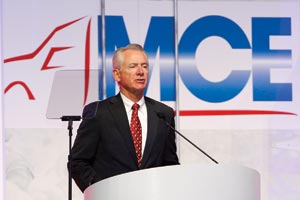Senior Reporter
Unity, Persistence Needed to Help Trucking Achieve Key Goals This Year, Graves Says

PHILADELPHIA — By coming together and more closely aligning their priorities, trucking leaders will do more to persuade federal policymakers to reform regulations, American Trucking Associations President Bill Graves told industry executives here at the annual Management Conference & Exhibition.
Graves explained that as a unified voice, ATA members would be better positioned to advance ATA’s legislative agenda, including overhauls of the Federal Motor Carrier Safety Administration’s scoring program for carriers and hours-of-service rules for truckers.
Divisive issues, such as fuel-efficiency standards, insurance limits and how to pay for highways, should not discourage members from participating in ATA’s efforts on Capitol Hill, he said.
“The only way to shape the future of this industry, in whatever form or fashion you believe in, is to be a member of ATA, to be sitting at the table and have the willingness to express your opinions about the policies and regulations that will affect you in the future,” Graves said Oct. 18 during his annual State of the Industry address.
COMPLETE COVERAGE: MCE 2015
He added, “If you’re not here, we definitely can’t hear you. And even if you’re here and you don’t speak up, we can’t help you. This federation is structured like a participatory democracy, and participation — vocal participation — is a critical element of getting the full value of your membership.”
Graves also urged ATA members to carefully review the 2016 presidential campaign, asking them to arrive at a sound choice for the next occupant of the White House. He offered little praise for many of the women and men currently pursuing the presidency.
Graves, a Republican, served two terms as governor of Kansas and has strong ties to the GOP. “The problem I think we face as a nation is the growing trend of people running for president who don’t have the skill set to manage their way out of a paper bag,” Graves said.
“Think very carefully about the unrest that permeates this world and ask yourself who would be the best leader to guide us toward greater national security and global peace,” he added. “Whether you like it or not, our political leaders have enormous influence — through their actions — on whether you will be successful or not.”
As he has done in previous years, Graves called on Congress to pass a multiyear highway bill that would address the industry’s concerns. He applauded House lawmakers for considering a six-year highway bill that would require a study of FMCSA’s Compliance, Safety, Accountability program. The legislation would require FMCSA to present Congress with a plan for reforming CSA. Upon the bill’s enactment into law, certain CSA data would no longer be made public until U.S. Department of Transportation’s inspector general conducted an extensive review of the CSA program.
“If we can get Congress to move on a highway bill, we’ve got language in the just-released chairman’s markup that addresses some of our CSA concerns,” Graves said, stressing the importance of preserving a robust federal transportation network.
“Government is not the enemy. Unfocused, unresponsive government is the enemy. Sloppy, wasteful government is the enemy. Overreaching, underperforming government is the enemy,” he said. “Too much government creates dependences that stifle personal responsibility and initiative. Too little government leaves gaps in critical programs and services that are necessary elements in sustaining this nation’s quality of life.”
Aside from CSA, Graves applauded the House transportation bill for including provisions that would enhance the recruitment of young drivers, alleviate traffic congestion in metropolitan areas and provide companies with an option on employment drug screening.
Graves also noted fiscal 2016 funding legislation that would expand on the requirements of an hours-of-service study due out in December. The House transportation appropriations bill states that before FMCSA’s 34-hour restart rule for truckers is reinstated, a study must be conducted addressing whether the rule has safety benefits and whether it is better for drivers in terms of fatigue, health, longevity and work schedules. Congress temporarily suspended the rule last year.
“In the appropriations bill, we’ve got language that helps resolve our hours-of-service concerns and addresses truck productivity,” Graves said.
Since this year’s MCE was relatively close to ATA’s headquarters in Arlington, Virginia, the federation sponsored a staff trip that gave dozens of employees the chance to experience ATA’s magnitude. And for many staffers the trip marked the first time they had attended the conference.

